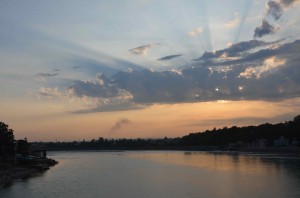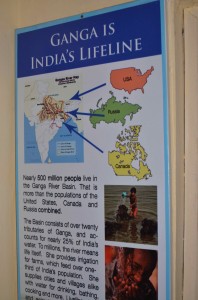Do Rivers Have Rights?
Dec 4th, 2013 | By admin | Category: Environment/SustainabilityBy Suzanne York, www.howmany.org
For a river that is as venerated as the Ganges River (known as Ganga to Indians), it comes as a shock when people hear how polluted and imperiled the waterway is today.
Roughly 3 billion liters of sewage is dumped into the river every day, and there is further contamination of the Ganges from solid waste, agricultural run-off, religious waste, and decomposing animals (which includes humans).
The United Nations has declared the Ganges as one of the world’s fastest and most threatened rivers, and the entire Ganges River Basin is under threat. The Ganges and its tributaries support almost 500 million people, irrigate one-third of India’s land and account for 25% of the country’s water resources.
Promoting a Rights-based Approach
This past November Global Exchange, a human rights organization based in San Francisco, CA, organized a rights of nature study tour to India that included a visit to Ganga Action Parivar, an Indian NGO working to restore and protect the Ganges River.
According to Shannon Biggs from Global Exchange, recognizing that nature has rights is a potentially powerful tool for protecting the planet. Rather than treating nature as property, Rights of Nature acknowledges that nature in all its life forms has the right to “exist, persist, maintain and regenerate its vital cycle.” It is a movement to turn the unsustainable system of globalized economic growth on its head in favor of people and the planet.
India, with a population of over 1.2 billion people (much of it rapidly urbanizing, and yet still grappling with tremendous poverty) and a developing economy, is in many ways ground zero for how society can “develop” with a focus on human rights and the environment. Climate change, pollution, loss of biodiversity, gender inequality, inequity, industrial agriculture and more pose threats to not just Indians, but all of us.
The rights of nature concept offers a rights-based approach to protect what is truly valuable in today’s world – nature and people – and a path to build a healthy planet for now and for future generations.
Ganga Lifeline
India and international organizations are spending large amounts of money to clean up its polluted rivers, but thus far not much has happened. It is time to implement sustainable and forward-thinking actions to protect the Ganges and all of India’s rivers.
In 2012, the Whanganui River in New Zealand was given “legal standing and an independent voice” under an agreement to settle the historical claims of the Whanganui Iwi indigenous people.
The National Ganga Rights Movement is a coalition calling for a National Ganga Rights Act which would, among other things, establish, secure, and defend the inalienable and inherent rights of the Ganga River, its tributaries, and watershed, and the rights of the people of India to a healthy, thriving river basin. And, it “establishes the rights of the people of India and their governments to defend and enforce the rights of the Ganga.”
Specifically, the proposed legislation would:
• Establish the basin’s right to exist, thrive, regenerate, and evolve;
• Establish the rights of the people, as well as other ecosystems and natural communities, to a healthy river basin;
• Provide that any activity that interferes with the basin’s rights is prohibited;
• Provide that any damages that may be awarded for violations of the basin’s rights are to be awarded for the purpose of, and in the amount necessary to, restore the ecosystem to its pre-damaged state;
• Establish enforcement mechanisms to protect and defend the basin’s rights, including establishing governmental offices responsible for defending those rights; and
• Empower people, communities, civil society, and governments within India to protect and defend the basin’s rights.
The Ganges Rights movement is bringing together a variety of people and organizations to raise awareness and to empower communities to protect the river and promote sustainable solutions.
This is just a taste of the work being undertaken to protect the Ganges. Stay tuned for more on solutions Ganga Action Parivar and others are proposing.
Suzanne York is Senior Writer with the Institute for Population Studies and was in India with Global Exchange in November 2013.


